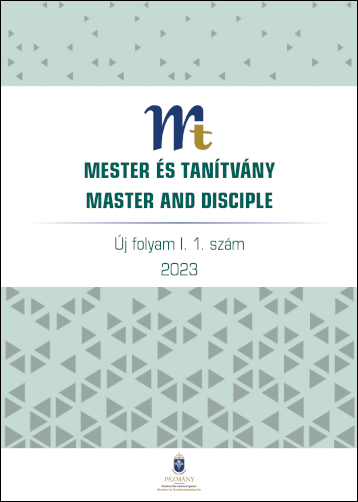Megjelent 2023-09-20
Kulcsszavak
- tanárképzés,
- tanárképzési paradigmák,
- filozófiai jelleg,
- antropológia,
- etika,
- társadalomfilozófia,
- előkészítő kurzus,
- társadalmi elvárások
Absztrakt
A tanárképzésben az utóbbi évtizedekben többféle új szempont érvényesült. A pszichológia szerepének a növekedése, szaktudomány jellegű, a módszertanközpontú, a kutatásalapú, a gyakorlatorientált képzés mindegyike fontos elemeket adott hozzá a tanárok kompetenciájának a növeléséhez. Ma sok olyan nehézség elé vannak állítva a tanárok, amelyek másféle képzési elemek jelenlétét igényelhetik, pl. HH, SNI, BTMN tanulók, kulturális és életmódbeli különbségek, kisebbségek, szülőkkel való kapcsolattartás/együttműködés, oktatáspolitikai kérdések, etikai és társadalmi elvárások stb. Ezért szükség lehet egy filozófiai jellegű képzési elem bevezetésére, antropológiai, etikai, társadalomfilozófiai hangsúllyal. A kurzust egyrészt a képzés elején lehetne bevezetni alapozó jelleggel, másrészt az elméleti tudnivalók mellett kiemelt szerepe kell, hogy legyen a témában releváns szövegek elemzésének, statisztikák, kutatások, esettanulmányok, riportok megismerésének. A tanulmány áttekinti a különböző paradigmákat és a filozófiai jellegű propedautikának a szüksége mellett hoz fel érveket.
Hivatkozások
- Csapó Benő (2015). A kutatásalapú tanárképzés: nemzetközi tendenciák és magyarországi lehetőségek. Iskolakultúra 2015(11), 3–16. https://ojs.bibl.u-szeged.hu/index.php/iskolakultura/article/view/21721/21511
- Darling – Hammond (2006). Constructing 21 st Century Teacher Education. Journal of Teacher Education 2006(10), 1–15.
- Iker J. (2016). Gondolatok a pedagógusképzésről. Új Pedagógiai Szemle 2016(1–2), 27–31. https://epa.oszk.hu/00000/00035/00174/pdf/EPA00035_upsz_2016_01-02.pdf
- Kormos J. (2019a). Filozófiáról bölcsészeknek és tanároknak. PPKE BTK.
- Kormos J. (2019b). A pedagógia és a filozófia kapcsolódási pontjairól. Kaposi József & Szőke-Milinte Enikő (szerk.) (2019). Pedagógiai változások – a változás pedagógiája. PPKE BTK, 267–274. https://btk.ppke.hu/uploads/articles/1734918/file/Pedag%C3%B3giai%20v%C3%A1ltoz%C3%A1sok%20B1%2BB4%2Bbel%C3%ADv%20screen.pdf
- N. Kollár K. & Szabó É. (szerk.). (2017). Pedagógusok pszichológiai kézikönyve I. Osiris. https://dtk.tankonyvtar.hu/handle/123456789/2913
- OECD (2019). A Flying Start: Improving Initial Teacher Preparation Systems. OECD Publishing. https://doi.org/10.1787/cf74e549-en
- Pelesz N. (2021). Repülőrajt – A pedagógusképző rendszerek fejlesztése. Pedagógusképzés 2021(3), 111–113. https://doi.org/10.37205/TEL-hun.2021.3.07
- Polákovits N. (2018). A tanítási gyakorlatok szerepe a tanárképzésben. In Szőke-Milinte E. (szerk.). (2018). Pedagógiai küldetés – a küldetés pedagógiája. PPKE BTK, 131–146. https://btk.ppke.hu/uploads/articles/1734918/file/Pedag%C3%B3giai%20k%C3%BCldet%C3%A9s.pdf
- Pukánszky B. (2014). A magyar iskolatörténet és tanárképzés paradigmái. Selye János Egyetem Tanárképző Kar, Komárom. http://www.pukanszky.hu/eloadasok/Tarhos/Pukanszky_MC%2015_VNUTRO_TLAC.pdf
- Rapos Nóra - Kopp Erika (2016). Szükséges/lehetséges-e a pedagógusképzés újabb átalakítása? Kézirat. Szakmai anyagok a Tanárképzők Szövetségének 2016. január 23-i üléséhez. https://doi.org/10.37205/TEL-hun.2016.1-4.05
- Rapos Nóra – Szivák Judit (2015). Az osztatlan tanárképzés KKK-elemzésére épülő alapelveinek, képzési struktúrájának és tartalmának meghatározása In Rapos Nóra – Kopp Erika (szerk.) (2015) A tanárképzés megújítása. ELTE Eötvös Kiadó, 11–32.
- Sárkány P. (2020). A nevelésfilozófia új kézikönyve. Új Pedagógiai Szemle 2020 (1–2), 155–156. https://upszonline.hu/index.php?article=700102015
- Smeyers, P. (2018). International Handbook of Philosophy of Education. Springer. https://doi.org/10.1007/978-3-319-72761-5
- Szabó R. & Tóth K. (2021). „Tudós tanár – tanár tudós” egy védés margójára. Magyar Tudomány, 2021(3), 413–419. https://doi.org/10.1556/2065.182.2021.3.12
- Thomson, S., Cornelius, S., Kopp, E., & Jaap v. L. (2021). Határátlépések a tanárképzésben. Pedagógusképzés, 2021(1), 76–98. https://doi.org/10.37205/TEL-hun.2021.1.04
- Weiß, G. & Zirfas, J. (2020). Handbuch Bildungs- und Erziehungsphilosophie. Springer. https://doi.org/10.1007/978-3-658-19004-0

